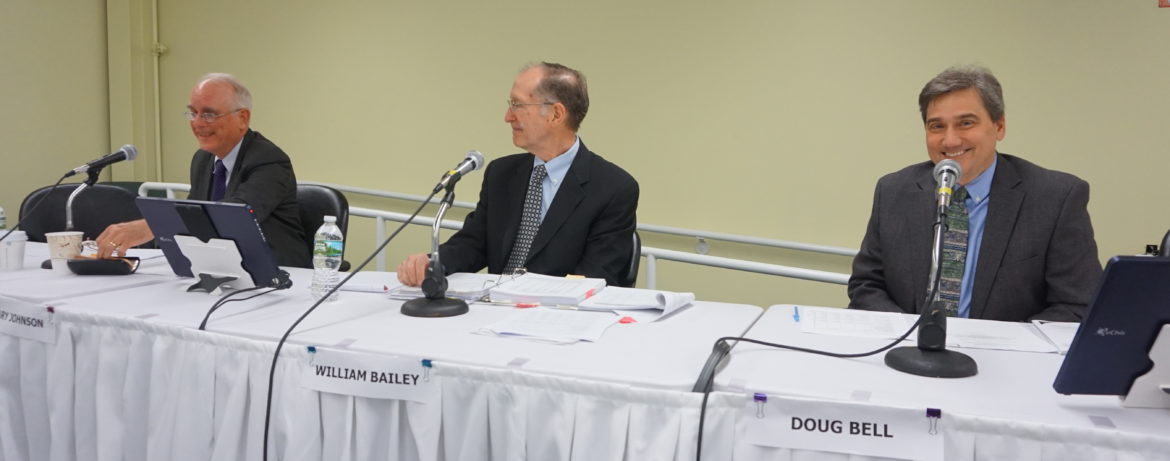CONCORD – Questions about possible health risks to the elderly residents of Sherburne Woods in Deerfield from Northern Pass’s electromagnetic field took center stage Wednesday on Day 5 of hearings that will determine the fate of the proposed 192-mile transmission line from Pittsburg to Deerfield.
Northern Pass experts also faced cross-examination on issues ranging from construction noise to whether there is an agreement in place between Northern Pass and Hydro-Quebec to fund the $1.6 billion project to bring hydroelectricity from Canada to the New England grid.
Maureen Quinn of Deerfield cited studies indicating cardiac pacemakers and other implanted medical devices could be affected by the fields. Northern Pass experts said there was no risk of failure to such devices due to the transmission lines.
Testifying for Northern Pass, Dr. William Bailey said: “I don’t have an expectation that anyone walking on the right of way will have a problem with an implanted medical device.”
Quinn presented a Google earth map showing Sherburne Woods’ proximity to the proposed high-voltage transmission line right of way in Deerfield.
“This elderly housing complex is 35 feet from the right of way,” Quinn said. “Even if the proposed Northern Pass project complies with these guidelines, there could be interference with medical devices that residents of Sherburne Woods – or potentially any other residents along the line – might experience. Isn’t that the case?” Quinn asked.
Quinn went on to say that interference with pacemakers may occur even at levels below recommended levels. During a break, Northern Pass spokesperson Martin Murray said there is definitely no danger from the project’s electromagnetic fields.
“It is in our absolute best interest to do this project with safety in mind, the goal is to have as little impact as possible,” Murray said. “We build to protect against that.”
After the hearing, Will Abbott, vice president of policy for the Society for the Protection of New Hampshire Forests, cited Quinn’s references to the World Health Organization’s “concept of prudent avoidance” of the electromagnetic fields.
“Does science know everything? No,” Abbott said. He said prudent avoidance of human beings interacting with electromagnetic fields should be an important consideration.
“It makes common sense not to put people in harm’s way,” Abbott said. Constructing the lines underground would drastically reduce the problem, he said. “They should just bury the whole line.” As proposed, only 60 miles would be underground.
Bailey testified that he searched a government database that collects data on electromagnetic fields causing interference with implanted medical devices and could find none related to transmission lines.
He found many reports in which interference with implanted medical devices had been observed from stereo speakers, security systems at bookstores and convenient stores, but none from electric transmission lines.
Questions were also raised about whether there is a contract in place between Northern Pass Transmission and Hydro-Quebec to guarantee funding for the $1.6 billion project.
A letter from the Federal Energy Regulatory Commission responding to questions from U.S. Sen. Jeanne Shaheen, D-NH, was discussed during testimony.
Abbott said it raises questions as to whether there is anything filed with FERC that indicates Hydro-Quebec agreed in principle to the $1.6 billion project.
“Representations have been made in the media that everything is hunky dory between the two parties,” but it is not clear from the documents that that is the case, Abbott said.
Murray said Northern Pass and Hydro-Quebec have extended the Transmission Service Agreement through Dec. 31, 2020. “If you look back on the joint press release, Hydro-Quebec acknowledged the Transmission Service Agreement is in full force and effect,” Murray said.
Walter Palmer, owner of Franconia Farms, addressed questions of noise as did Brad Thompson of Stewartstown.
Palmer questioned the wisdom of burying the power lines through downtown Franconia and Plymouth, busy Main Street areas that will be disrupted for as long as construction lasts.
Northern Pass expert Douglas Bell was asked if the 60 miles of buried lines had been studied for potential noise during construction and he said that had not been done.
Murray expects the plan will receive the needed federal approvals by Dec. 31. The state Site Evaluation Committee must decide by Sept. 30 whether to approve or deny Northern Pass’s application.
There will be at least 24 more day-long hearings in Concord before the state Site Evaluation Committee through July, according to Pam Monroe, the administrator for the SEC. The next planning meeting will be April 28 and the next hearing to take testimony will be May 1.





